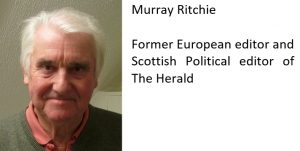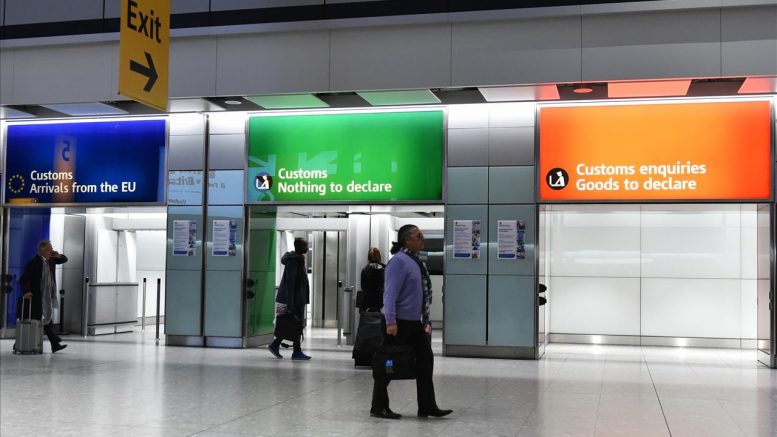Is Prime Minister Theresa May resigned to Customs Union membership for the UK after Brexit? Murray Ritchie suspects the answer is ‘yes’.
First it was the judges who were “enemies of the people” in the words of the fiercely pro-Brexit Daily Mail, furious at the Supreme Court for siding with parliament against the government.
Now we have moved on to “peers against the people” in the view of the uber-Thatcherite Michael (now Lord) Forsyth, furious that Brexiteers in the Upper House have just suffered a stinging defeat.
His Lordship is indignant that his fellow peers voted by a surprisingly large majority to defy the government by backing Customs Union membership for the UK post Brexit. The blue funk enveloping hardline Brexiteers is intensified by senior MPs now demanding a vote on staying in the Customs Union and the European Union strangling at birth the UK’s plan for solving the Irish border problem.
Pro-EU forces hail these moves as further progress towards a soft Brexit. Indeed it is difficult to disagree that a clean break with the EU and a good deal are mutually exclusive.
If leaving the EU fulfils the nation’s democratic wish (if you’re English or Welsh) then a sensible outcome might be to throw a bone to the Remainers by preserving our existing trading advantages
Even if the Withdrawal Bill pings back and forward between the Commons and the Lords as it seems destined to do, the likelihood is that there will be no majority among MPs for giving Theresa May her way. Eventually their Lordships must give up after a respectable period and bow to the superior democratic legitimacy of the Commons. If the figures stack up, as seems increasingly likely, this acknowledgment of constitutional propriety will hand victory to the Remainers among their Lordships.
Matters are moving ever more ominously against the Prime Minister. How much longer can she hold out in the hope of Brexit meaning withdrawal from the EU and all its works? “Brexit means Brexit” was always a meaningless phrase, or at least one offering multiple definitions. How plausible is it that she will yet interpret it as the UK leaving the EU but remaining in the Customs Union – and possibly even the Single Market – as the only possible outcome?
Suddenly there is a spring in the step of the anti-Brexit forces. Optimists among them even see some hope now of reversing Brexit or even having a second referendum on the terms. The avoidance of a hard Brexit, which still seems the only plausible alternative, is drawing closer.
Otherwise Lord Forsyth and those who think like him would not be so upset. They know the surprisingly large Lords majority will only encourage like minds in the Commons. Rebel Tories will feel a touch more confident of getting their way – although that way is still to be clearly defined.
And what of Labour? Can Jeremy Corbyn’s commitment to a customs union as distinct from “the” Customs Union be sustained if it becomes clear he could yet have the latter?
“Brexit means Brexit” was always a meaningless phrase, or at least one offering multiple definitions
Many MPs who only reluctantly respect the will of the democratic majority must now be wondering if public impatience with the whole wretched Brexit process can be put to good use. Will they find the courage to support remaining in the Customs Union against the wishes of their divided constituents by pleading the national interest?
That question is becoming more real by the day. The economic argument is intensifying as decision day looms and the people, weary of the endless Brexit mess, increasingly appear to accept the agony must end in some compromise. If leaving the EU fulfils the nation’s democratic wish (if you’re English or Welsh) then a sensible outcome might be to throw a bone to the Remainers by preserving our existing trading advantages. Scotland and Northern Ireland would happily go along with that.
Remaining in the Customs Union would answer those who complained that we voted to join the Common Market but not the EU. The Customs Union offers what many want – membership of a common market but no longer the EU.
After the appalling Windrush scandal and concerns over Russia and Syria, the debate about migrant workers has been rather quietened. MPs can bet safely now that a return to the Irish Troubles if the border issue is unresolved will loom more menacingly than immigration.
Any sort of deal that excludes the Customs Union seems out of the question. Recent noises from Brussels indicate that the EU is playing hardball – and that means there can be only one winner on that issue. Remaining in the Customs Union or the Single Market now seems unavoidable.
Brexit has doubtless many twists and turns to come, possibly sooner than we think as the Lords continue their debates. Yet it does seem that the tide is turning, and Mrs May is today’s Canute.





